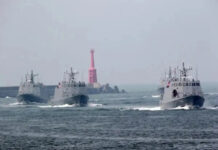China blames the US for the unfolding situation in Afghanistan, calling its troops withdrawal ‘hasty’
China’s reaction to the growing instability in Afghanistan is the sharpest among the Asian countries that are watching the tactics of the Taliban to take control of the country even as the United States gradually withdraws itself from there. China blames the United States for the unfolding situation in Afghanistan, saying its withdrawal is “hasty” and is leaving behind a “mess and turmoil” for the people of that country. The Chinese Foreign Ministry is also accusing the United States of “disregarding” its responsibilities and obligations. As of date, the Taliban are said to be closing in around provincial towns of that country, claiming to have already taken control over the far-flung and border regions. The latest reports suggest the Taliban are in the process of surrounding the town of Ghazni. It is situated on the main road between the capital Kabul and Kandahar city. The Afghan forces have so far managed to ensure that none of the big towns falls to the Taliban, but time is running out. China appears clearly agitated over the happenings inside Afghanistan. Its main worry is of the instability and radicalisation growing further and spilling into China once the American withdrawal is complete. The Chinese criticism of the United States brings out an irony — China did not like the American invasion of Afghanistan in 2001 for reasons of deployment of American troops closer to its border and also accused it of destabilising the region.
Today, it is critical of Americans as they prepare to leave the country permanently. What it never articulates is the fact that the American presence in Afghanistan for two decades helped erase Chinese concerns about the 9/11 attacks and subsequent fighting in Afghanistan radicalising Muslims and eventually influencing unrest in China’s north-west Xinjiang Autonomous Region, home to the Uighur Muslims. While the United States invested heavily in Afghanistan, China used that time to strengthen itself, and secondly, by extending nominal support to the Americans’ war on terror, China found a justification for its State policy on Uighur Muslims after playing up terror threats from them. Looking forward, China sees an opportunity to play a role in Afghanistan either through a multilateral approach involving the United Nations or through increased involvement of the Shanghai Cooperation Organisation. The SCO has as its members nearly all the regional stakeholders and that can offer legitimacy to any intervention in Afghanistan. While such efforts will enhance China’s image in the stabilisation efforts, it would allow Beijing time to hedge its bets between Kabul and the Taliban. China would need protection for its projects under the China-Pakistan Economic Corridor, like the proposed railway line to Kandahar. China would also want to ensure that Uighur Muslims do not get safe havens in Afghanistan. The Taliban have recently said they see China as a “friend” and would not entertain the Uighurs. Such assurances would encourage a greater Chinese presence in the region in the absence of the Americans.




























